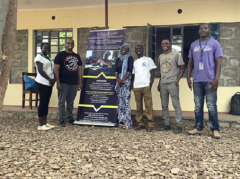By Mohamed Duale, PhD Student, York University
This August 2019, I had the opportunity to research refugee participation in the Kakuma Refugee Camp in northwest Kenya as part of the Local Engagement Refugee Research Network (LERRN). Kakuma Refugee Camp was established in 1992, and consists of four sub-camps (Kakuma 1, 2, 3, and 4). Today, Kakuma is home to an estimated 185,000 refugees from various countries in Eastern and the Horn of Africa.

With staff of Resilience Action International (formerly SAVIC), a refugee led NGO in Kakuma 2.
The camp is a vast and culturally diverse complex with large communities of displaced persons from South Sudan, Somalia, Congo, Ethiopia, Eritrea, Burundi, Rwanda, Uganda, as well as the local Turkana people, who are the host community. Sections of the camp are thriving business centres, namely the Somali and Ethiopian markets, and refugees run a large number of small businesses within Kakuma Town, making refugees key economic actors in Turkana County. Many of the residential blocks in Kakuma have been named after global cities, such as Dubai, Hong Kong, and Mexico City, speaking to the cosmopolitan consciousness and aspirations of the refugees in Kakuma.
Given the significant role played by refugees in the economic and social life of Kakuma, I was curious to know how involved refugees are in the programming and overall governance of the camp. My research was centred on the role of refugees and refugee led community-based organizations (CBOs) in refugee programming in the camp.
Community leaders, refugee incentive workers, and refugee-led organizations in particular play critical representative, consultative, communication and service provision functions. They work with international and national NGOs which fund and deliver humanitarian programs in the camp. Refugee participation is thus seen by refugees and policymakers as an integral part of the design, implementation, and evaluation of programs and services, and essential to the overall functioning of the camp.
In my time in Kakuma, I spent a lot of time talking to community leaders, refugee incentive workers and general members of refugee communities and learned that refugees are heavily involved in the delivery of programs and the dissemination of information but excluded from decision-making regarding the design and evaluation of humanitarian programming. It was also evident that restrictions on mobility and employment continue to frustrate refugee workers in the humanitarian sector, as they are only paid an ‘incentive’ wage, typically a fraction of what a national is paid in the same role.
Problems with registering refugee-led CBOs in an increasingly security-conscious country have hampered many initiatives. As well, ongoing tensions between the refugees and the host community occasionally boil over to conflict, and some refugees from certain communities expressed fears for their safety in the camp, dampening the enthusiasm of some to be civically engaged.
Despite these challenges, Kakuma is replete with many examples of refugees partaking in the social development of their communities, including refugee-led CBOs and NGOs providing English language, computer literacy, entrepreneurship, health, and social protection programs often with the support of the UNHCR and NGOs.
As such, refugee-led CBOs can serve an important role in addressing gaps in services whilst working in complementarity with overall humanitarian programming. The leaders of refugee-led organizations are often young, well-educated, English-speaking and fluent in three or four other languages. Though they are among the elite of the refugee community, they are often called on to serve as the “voice of refugees,” advocating for and relaying information to their respective communities.
One of the key learnings for me was realizing the untapped potential of refugee leaders and incentive workers, who possess substantial academic capacity and could play a more participatory role in knowledge production in forced migration research beyond being key informants. I was amazed at the cultural diversity and cosmopolitan worldviews within refugee led CBOs, which signaled to me the importance of refugees’ civic engagement as a source of peacebuilding within the camp and the wider region.
I will be analyzing the data I’ve collected and will be writing a working paper in the next few months, which will be posted on LERRN’s website.
As a team, I believe we have laid the groundwork for future LERRN researchers to dig deeper and continue where we left off in summer 2019. I’m grateful for the hospitality and support of so many, particularly of those in refugee-led organizations.